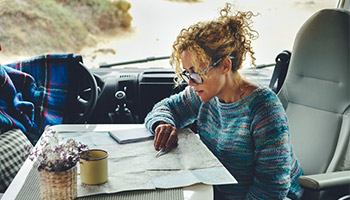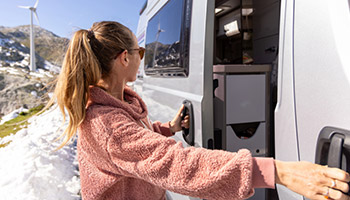Solo RV Adventures: 13 Tips for Women RVing Alone
Solo RV travel can be an incredibly rewarding experience, offering the chance to connect with yourself, explore at your own pace, and fully immerse yourself in the freedom of the open road. Yet, it’s perfectly natural to have safety concerns, especially as a solo female RVer venturing into unfamiliar territories or remote wilderness. You don’t want to be targeted by thieves or others with a heinous agenda simply because you’re alone. If you’re thinking about taking a solo RV trip, the key to a successful journey lies in preparation, awareness, and confidence. Whether you’re chasing sunsets across wide-open plains, finding solitude in forests, or navigating vast deserts, these 13 tips will teach you how to stay safe while having a fulfilling solo RV adventure.
Preparing for Your Solo RV Adventure
1. Master Your Rig Inside and Out
Before embarking on a solo RV trip, familiarize yourself with every aspect of your RV, from maneuvering and hooking up utilities to troubleshooting common issues. Confidence comes with practice, so spend time perfecting skills like backing into tight spaces or setting up your campsite efficiently.
2. Ensure Your RV Is Roadworthy
Your RV needs to be in tip-top shape before you hit the road. Schedule a thorough inspection with a trusted RV technician. You don’t want to find yourself stranded on the side of the road. Learn the basics, such as checking tire pressure, oil levels, and battery health. A little maintenance know-how can save you from unexpected breakdowns and ensure a smoother journey.
3. Plan Your Route and Destination

Research your routes and stops in detail, prioritizing locations with strong safety reputations, especially when planning to boondock or stay in remote areas. Use RV-specific apps to find safe campsites and rest areas. This will help you avoid potentially risky situations and areas, especially when traveling late at night.
4. Take a Self-Defense Class:
Peace of mind is priceless, and self-defense classes offer just that. Consider taking a class to learn practical techniques for protecting yourself and de-escalating tense situations. Many of these classes also focus on situational awareness, which is a critical skill when navigating unfamiliar places or handling threatening situations.
5. Share Your Plans With a Family or Friend
Share your travel plans with a trusted friend or family member. Provide them with your itinerary, including your campsites and expected arrival times. Use GPS tracking apps to let them monitor your location in real-time. These check-ins don’t just reassure your loved ones – they also ensure someone has your back.
Staying Safe on Your Solo RV Trip
1. Trust Your Intuition
Your intuition is your best travel companion. If a person or situation feels off, trust that gut feeling and remove yourself. Move to a different spot, skip that roadside stop, or ask for help if needed. It’s better to be overly cautious than to end up in an uncomfortable or even dangerous situation. Stay vigilant about your surroundings.
2. Secure Your RV

As soon as you settle into your RV site, make security a top priority. Lock doors and windows at all times, even when you’re inside. Consider extra measures like installing motion-sensor lights, door alarms, or other RV security systems. Keep emergency tools, such as a fire extinguisher and pepper spray, easily accessible.
3. Park Smart
When parking for the night, prioritize well-lit areas. Campgrounds with active communities of fellow RVers can offer camaraderie and safety. If you’re staying at a store or rest area, choose spots close to entrances or security cameras. Consider also staying close to other RVers, even when boondocking. This way, if an emergency arises, help is within reach.
4. Be Discreet
While it’s important to be friendly and open to new experiences, exercise caution when traveling solo. Avoid sharing personal details, such as your itinerary or when you’ll be alone at your campsite. If asked, a simple “My partner’s joining me later” works wonders. If someone seems overly persistent or suspicious, trust your instincts and remove yourself from the situation.
5. Arrive Before Sunset
Navigating unfamiliar roads or setting up camps is always easier in daylight. Aim to arrive at your destination well before nightfall, especially if you haven’t secured a campsite reservation. This allows ample time to set up camp securely and relax. Arriving early also gives you time to explore the area, meet neighbors, and prepare for a peaceful evening.
6. Stay Connected

Check-in regularly with someone you trust. A quick text or call takes just minutes but provides peace of mind for everyone. Consider using a real-time GPS tracking app to allow your loved ones to monitor your location. Apps like Life360 are excellent tools for staying connected and sharing your journey.
7. Blare the Horn
If you sense any unusual activity around your RV, don’t hesitate to draw attention immediately. A blaring horn, flashing lights, or loud music can quickly deter unwanted visitors. Safety alarms and motion-activated lights are also excellent deterrents. If you’re feeling uneasy, don’t hesitate to move to a different campground or seek help from park rangers or local authorities.
8. Bring Your Dog
Traveling solo in an RV can be incredibly rewarding, and bringing a furry friend can enhance the experience while doubling as a security system! Even a small dog can alert you to unusual activity. Just make sure your destinations are pet-friendly, and always keep your furry friend’s needs in mind.
Protecting Your Investment: RV Insurance
Being prepared isn’t just about safety gear and plans – it’s also about having the right insurance. Specialty RV insurance can cover everything from accidents to theft, and many policies include valuable roadside assistance. This can be a lifesaver, especially for solo travelers. Speak with an RV Insurance Specialist at (866) 501-7335 to discover what coverage matches your unique RV lifestyle.
The information in this article is obtained from various sources and offered for educational purposes only. Furthermore, it should not replace the advice of a qualified professional. The definitions, terms, and coverage in a given policy may differ from those suggested here. No warranty or appropriateness for a specific purpose is expressed or implied.
